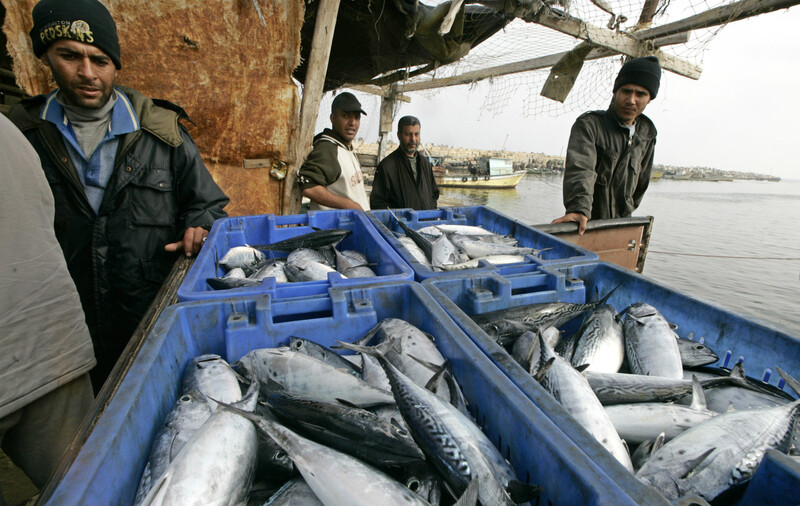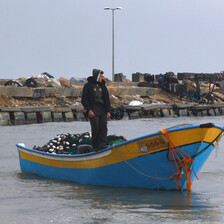The Electronic Intifada Gaza City 1 October 2012

Gaza’s fishing industry has been devastated by Israel’s movement restrictions and military attacks.
APA imagesGAZA CITY (IPS) - “From the coast to eight miles out, the sea is like a desert: it’s sandy and there are no fish,” said Mohammed al-Bakri, tracing a thick line on the wall map before him.
As the general manager of Gaza’s Union of Agricultural Work Committees, al-Bakri is well-versed in the woes of Gaza’s fishermen and farmers. “The Israeli navy attacks the fishermen, arrests them and takes their boats, even within three miles,” he said, referring to the limit the Israeli authorities have unilaterally imposed on Palestinian fishermen.
Under the Oslo accords, Palestinian fishermen are authorized to fish 20 nautical miles into Gaza’s sea. The Israeli authorities have illegally downsized Palestinian fishing waters, using lethal violence to enforce new restrictions on fishing. Palestinian fishermen are routinely attacked by the Israeli navy, using machine guns, water cannons and shells. Abductions of fishermen also occur.
“When the fishermen are arrested, they just have a boat and a net,” al-Bakri said. “No weapons; they are just trying to catch to sell at the market, to earn money for their families.”
“More than 500 fishermen have been arrested and at least 12 killed by the Israeli navy,” he added.
With more than 3,600 fishermen and 70,000 persons dependent on income from the sea, Gaza’s fishing industry has been devastated by such Israeli tactics and policies. “When there is no income, fishermen must depend on food aid from the United Nations,” said al-Bakri. “But there are a lot of other needs, like housing, clothing, medical care, education.
“If the situation continues like this, we won’t see any fishermen on the sea in the future.”
Farmers targeted
Farmers in Gaza face many problems, too.
Al-Bakri referred back to the red line on the UN map of Gaza marked “areas restricted for Palestinian access.” Imposed unilaterally by the Israeli authorities, the “buffer zone” bans Palestinian farmers and civilians from the 300 meters of land flanking the boundaries between Gaza and Israel.
In reality, the UN, international observers and Palestinian organizations have documented Israeli soldiers’ targeting of Palestinians even as far as nearly two kilometers from the boundary lines.
“Shooting at people accessing restricted areas is often carried out from remotely-controlled weapon stations … every several hundred meters along the fence, each containing machine guns protected by retractable armoured covers, whose fire can reach targets up to 1.5 km,” a UN report has stated.
As a result of machine gun fire, shelling, flechette (dart) bombs, drone attacks, land razing and setting crops on fire, the Israeli army has rendered one-third of Gaza’s agricultural land deadly and inaccessible.
Palestinian farmers continue to face Israeli attacks as they attempt to work on their land. For most farmers, the land is the sole source of income and food for their families.
“We need political support internationally, to pressure Israel into allowing farmers to work their land and fishermen to access their sea,” says al-Bakri.
Canadians heed call
Heeding his call, and hoping to build “connections of mutual solidarity between Canada and Palestinian farmers and fishers,” a Vancouver-based group aimed to broaden political support via their “Day of Action For the Fishers and Farmers of Gaza, Palestine.” The event was held on 30 September.
“This particular aspect of the siege is quite compelling because when a society is deprived of the ability to fish and to farm, it is deprived of its ability to sustain itself. It’s part of the ongoing Nakba [catastrophe; the systematic ethnic cleansing operations leading to the foundation of Israel], and part of the ethnic cleansing of Palestine,” said Charlotte Kates, a lawyer and one of the Day of Action coordinators.
Kates and a delegation travelled to the Gaza Strip earlier this year, meeting with Palestinian fishermen and farmers.
“We want to make it clear what is happening at the hands of the occupation, and how it is denying people’s right to live, to exist,” Kates said. “One of our translators could not attend our meetings: a cousin, in the ‘buffer zone’ had been murdered the same day by the Israeli military.”
Noting the close alliance of Canada with Israel, Kates said “the government of Stephen Harper has nothing but praise for the Israeli state that enforces this siege on Gaza. On 29 March 2006, Canada became the first country in the world to impose a siege on the Palestinian people living in Gaza and the West Bank, declaring cancellation of aid to Palestine.
“We want to build a movement that can challenge the Canadian government on these policies, policies which predate the Harper government.”
Canada is not alone in endorsing the illegal siege on Gaza — what Desmond Tutu, the retired South African bishop, and UN special rapporteurs on the West Bank and Gaza, John Dugard and Richard Falk, among many others, have called collective punishment.
“The European Union has recently decided to increase their support for Israel,” said Mohammed al-Bakri. He was referring to an agreement reached between the EU and Israel in July, which both sides undertook to increase their cooperation in 60 areas of policy.
The day of solidarity with Palestinian farmers and fishers has the backing of, among others, Independent Jewish Voices, the Simon Fraser Public Interest Research Group, and former Vancouver city councillor Tim Louis.
“The UN is quite aware of the inhuman conditions that Palestinians are subjected to and yet there is no concrete action, except allowing humanitarian aid,” said Louis, calling for “the Canadian government to stop its indiscriminate support for Israel until such a time when Israel complies with international law.”
All rights reserved, IPS - Inter Press Service (2012). Total or partial publication, retransmission or sale forbidden.





